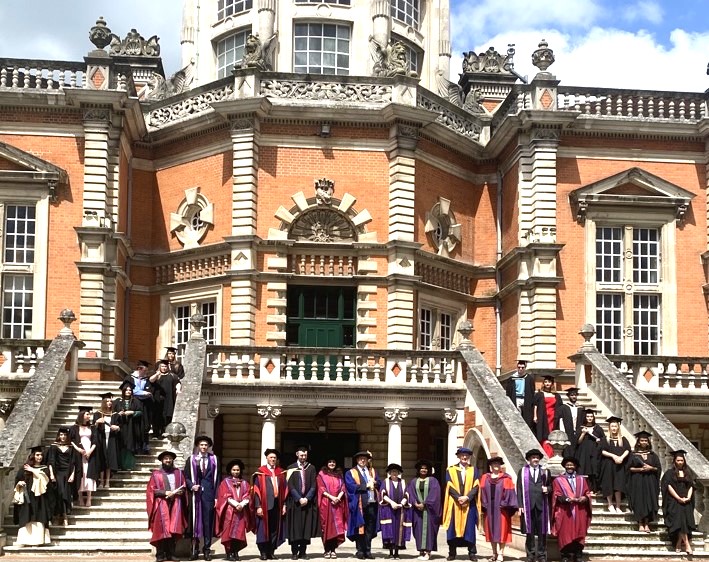Rosie Meek has been exploring prison, sport and rehabilitation for over 20 years. Her research has made her the go-to expert globally, informing policy and practice to make positive changes to the criminal justice system.

Tell us about your role at Royal Holloway and current secondment?
I’m a Professor of Criminological Psychology and Director of Impact within the Department of Law and Criminology. I’m also very privileged to be undertaking an 18-month secondment to the Ministry of Justice as part of a UK Research and Innovation Policy Fellowship. It’s a fantastic opportunity to get deeper into the work I’ve been doing with prisons and a chance to inform policy.
The Ministry of Justice department I’m working in oversees the impact of prison programmes and the evaluation of new criminal justice initiatives so it’s wonderful to be located directly in the area I’ve been researching all these years.
As Director of Impact, I’ve been focused on the quality of our impact at Royal Holloway, and how to better translate our department’s research into real life implications, policy and practice, so being based in a government department has given me a valuable insight into this process.
What inspired you to become a prison researcher?
Before I started my undergraduate degree in psychology, I volunteered for a criminal justice charity called New Bridge and this gave me first hand insights into some of the issues facing those who live and work in UK prisons. Once I became a student, I volunteered at my local Youth Offending Team – working in the community with children and families involved in the criminal justice system. Those combined experiences, and a strong sense of social justice, drove me to want to support people in the justice system and make our communities safer.
Later, whilst undertaking my doctoral research, I supported my studies by working as a researcher at the Howard League for Penal Reform. This gave me further insights into some of the issues with our prisons and the importance of campaigning and impactful research to stimulate positive change. It shaped my commitment as a prison scholar, and then with my PhD, I was able to draw on those connections and focus on identity transitions for young men in prison, and the importance of the transition prison-leavers face when they finish a custodial sentence and return to the community.
I spent lots of time in prisons for my field work and got invited to evaluate some prison programmes. One of these, was a sports-based programme set up by England footballer Ian Wright, as part of his TV show: Football Behind Bars.
As a researcher on the legacy project, I got to follow the progress of these young men from the programme to successfully integrating back into their communities and leading productive and healthy lives. One of these young men became a professional footballer and now wants to set up his own charity to support young people in prison. It’s great to see that full cycle of doing good work in prisons, and it’s inspired a lot of my work ever since.
Much of your prison research examines sport and wellbeing in prison. Why is that?
Early on, I became aware of the lack of academic research on the value of sport and physical activity in prison. Generally, people who end up in our prisons have poorer psychological and physical health outcomes and that's something we need to address. We know that if we help people improve both their physical and emotional health, they're less likely to re-offend. Sport and physical activity are relatively straightforward ways of promoting health and wellbeing and my research has shown, when done correctly, it can be immensely powerful and cost-effective.
To shed light on the value of sport for rehabilitation, I wrote Sport in Prison, aimed at professionals in the criminal justice system, policymakers and researchers. I soon became known as a specialist on the subject, helping organisations, governments and prisons who want to know more about the academic context and importance of sport in correctional settings.
I feel lucky that has taken me around the world, from the notorious San Quentin prison in California to observe their yoga and marathon programmes, to prisons across New Zealand to help establish their physical activity strategy, and of course to our network of prisons and youth institutions in England and Wales.
What research are you most proud of?
About five years on from my first book, I was asked by the Ministry of Justice to conduct an Independent Review of Sport in Youth and Adult Prisons. I’m proud of the report because it was written to be accessible to all and had a direct and positive impact on people in prison and those who support and work with prisoners.
All but one of the 12 recommendations in the report were accepted by government, and we’ve seen great progress on some already, such as a physical strategy for women and girls. I feel a responsibility to ensure those recommendations are being made and so there will be another review in 2028. It’s a chance to celebrate any progress but to also ensure that progress continues.
You’ve just conducted a project in collaboration with Her Majesty's Chief Inspector of Prisons for England and Wales. Tell us more.
This was a large piece of work I co-developed with Royal Holloway colleague and Professor of Criminal Justice, Nick Hardwick, and our colleague Dr Kim Reising, now at the University of Lincoln. Nick had previously been Chief Inspector of Prisons and was aware that enormous amounts of data being collected by the Prisons Inspectorate wasn't being used as widely as it could be.
The project involved us preparing a vast dataset made up of 100,000 prisoner surveys for academics to draw from. From this work, we’ve just completed some research around safety in prisons and numerous other findings are being written up as we speak.
This data repository will transform how criminologists and prison scholars can understand trends and help improve prison conditions. The legacy of that will be enormous. We’re planning a symposium next year to share findings, and the fruits of that work will continue long after we have both retired.

Find out more about the Department of Law and Criminology.
























